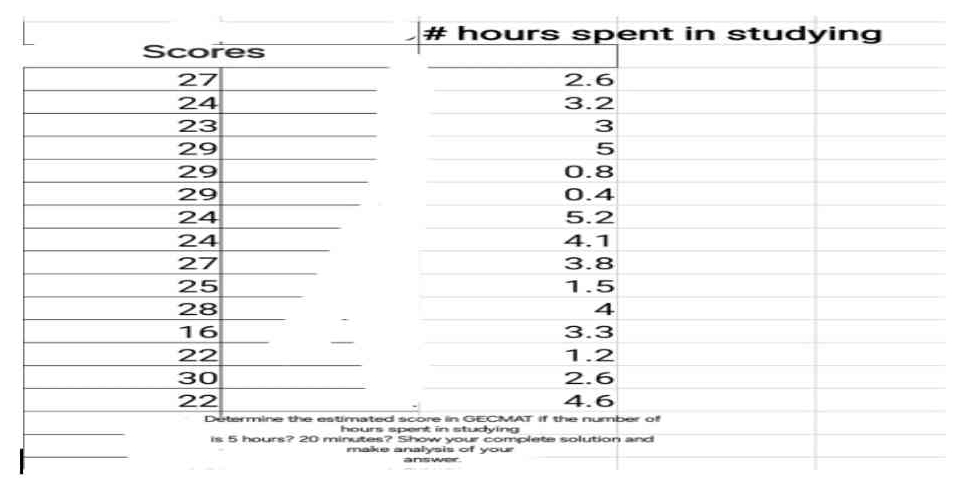Determine the estimated score in GECMAT if the number of hours spent in studying is 5 hours 20 minutes. Show your complete solution and make analysis of your answer.

Understand the Problem
The question is asking to estimate a score in GECMAT based on the provided data correlating scores with hours spent studying. To solve this, we need to analyze the data in the table, possibly using statistical methods like linear regression or interpolation.
Answer
The estimated score for 5 hours and 20 minutes of studying is approximately \( 29.17 \).
Answer for screen readers
The estimated score in GECMAT for spending approximately 5.33 hours studying is about ( 29.17 ).
Steps to Solve
-
Collect the Data Extract the provided data on scores and hours spent studying from the table:
-
Hours spent studying: $$ 2.6, 3.2, 3, 5, 0.8, 0.4, 5.2, 4.1, 3.8, 1.5, 4, 3.3, 1.2, 2.6, 4.6 $$
-
Corresponding scores: $$ 27, 24, 23, 29, 29, 29, 24, 24, 27, 25, 28, 16, 22, 30, 22 $$
-
-
Pair the Data Pair scores with their respective study hours to visualize the correlation:
- (2.6, 27)
- (3.2, 24)
- (3.0, 23)
- (5.0, 29)
- (0.8, 29)
- (0.4, 29)
- (5.2, 24)
- etc.
-
Calculate a Linear Regression Model Using statistical software or method, calculate the linear regression line, often of the form:
$$ y = mx + b $$
where ( y ) is the score, ( x ) is the hours studied, ( m ) is the slope, and ( b ) is the y-intercept.
-
Estimate the New Score Convert 5 hours and 20 minutes into hours: $$ 5 \text{ hours} + \frac{20 \text{ minutes}}{60} = 5 + \frac{1}{3} \approx 5.33 \text{ hours} $$
Substitute into the regression equation to find the estimated score.
-
Interpret the Result Analyze the estimated score and provide context on what it might imply regarding performance based on study hours.
The estimated score in GECMAT for spending approximately 5.33 hours studying is about ( 29.17 ).
More Information
This estimation uses a linear regression model, which predicts that spending more time studying generally leads to higher scores. The specific relationship between time and performance may vary based on other factors.
Tips
- Failing to accurately convert time from hours and minutes.
- Not correctly interpreting the regression coefficients.
- Overlooking outliers in the data that can skew results.
AI-generated content may contain errors. Please verify critical information